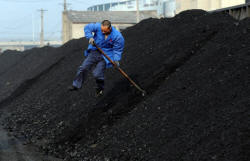|
China said in 2016 it would shed 100-150 million tonnes of
annual crude steel production and 500 million tonnes of coal
capacity in three to five years as it tried to tackle
price-sapping supply gluts in the two sectors.
To allay unemployment fears, China also made a $15 billion
special fund available to cover the costs of finding new jobs
for the estimated 1.8 million workers set to be laid off during
the retrenchment.
"With the timely allocation of 22.2 billion yuan in dedicated
funds, capacity cut targets for the steel and coal sectors were
exceeded in 2017," China's finance minister Liu Kun told the
standing committee of the National People's Congress on
Wednesday.
Liu said funding efforts to help large state-owned firms close
"zombie" subsidiaries, and ditch costly social obligations such
as education and health, had also helped cut average debt ratios
by 0.6 percentage points over the year.
In 2016, the first year of the campaign, China shed 65 million
tonnes of steel capacity and 290 million tonnes of coal
capacity, though the finance minister did not say in last year's
spending report how much money was allocated to resettle the
726,000 workers laid off during the year.
Liu also told parliament that the budget to finance China's war
against air pollution rose 43 percent year on year in 2017. He
did not give an absolute figure.
(Reporting by David Stanway, editing by David Evans)
[© 2018 Thomson Reuters. All rights
reserved.] Copyright 2018 Reuters. All rights reserved. This material may not be published,
broadcast, rewritten or redistributed.
Thompson Reuters is solely responsible for this content.
 |
|




